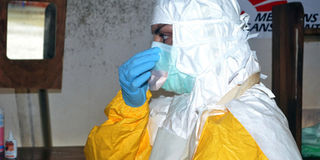State: We are prepared to deal with Ebola epidemic

A member of Doctors Without Borders (MSF) puts on protective gear at the isolation ward of the Donka Hospital, on July 23, 2014 in Conakry. The government Thursday allayed fears that Ebola has reached the country, and maintained it would not impose restrictions on international travel. PHOTO | CELLOU BINANI
What you need to know:
- Thursday, travellers arriving at the Jomo Kenyatta International Airport in Nairobi from West Africa were first screened before proceeding to the customs and immigration desks.
- The virus has so far killed 729 people in West Africa. Some 1,300 people have been infected since January this year.
- On Wednesday, fears grew that the outbreak in the region could spread to other continents with European and Asian countries on alert.
The government Thursday allayed fears that Ebola has reached the country, and maintained it would not impose restrictions on international travel.
However, doctors and other medical personnel had been deployed to all entry points and equipped to detect and manage any infections they come across, Medical Services Director Nicholas Muraguri said.
Dr Muraguri assured Kenyans that they were not under imminent threat from the contagion that has killed more than 700 people in the West African countries of Guinea, Liberia and Sierra Leone.
“As a precautionary measure, the ministry has alerted health workers about the Ebola outbreak in West Africa and has advised them to remain vigilant for unexplained illnesses in those arriving from the affected areas,” Dr Muraguri said.
He said the country’s Rapid Response Team and the Laboratory too had been activated and were on standby.
ANY RESTRICTIONS
“We are, therefore, well-prepared to identify and deal with any potential cases of Ebola within 24 hours,” he said.
Dr Muraguri said the ministry and the World Health Organisation (WHO) had not recommended any restrictions to be applied on the affected countries based on information about the outbreak.
Thursday, travellers arriving at the Jomo Kenyatta International Airport in Nairobi from West Africa were first screened before proceeding to the customs and immigration desks.
The screening entailed the passengers filling a form detailing their health status. Each of the passengers had also to be examined by health personnel.
The airport had earlier in the day been placed on alert, after a passenger said to be showing signs of the illness arrived. But he was found to have been suffering from high blood pressure.
“The cabin crew had alerted us that there was a passenger who had been sick on board. The passenger was travelling from Liberia in the company of his wife. Since we did not want to take chances, we screened him on arrival,” Airport manager Edward Kobuthi said.
NOT AT RISK
Mr Kobuthi said the airport had placed an ambulance on standby with clear instructions to take to Kenyatta National Hospital for quarantine and treatment, any travellers who exhibited signs of Ebola infection.
“At this point, we cannot say the country is at risk because we have adequate safety measures in place” Mr Kobuthi said.
The virus has so far killed 729 people in West Africa. Some 1,300 people have been infected since January this year.
Cases of the virus have been reported in Guinea, Liberia, Sierra Leone and other West African countries
The virus is transmitted through direct contact with fluids or secretions from bodies of those infected.
African airlines among them Kenya Airways, Ethiopian Airlines and Egyptair announced they had put in place pre- and on-board safety measures to deal with Ebola.
Dr Muraguri said health workers were working closely with officials from Kenya Airlines, Ethiopian Airways and Rwanda Airways which have 38 flights per week to and from the West African countries of Guinea, Liberia and Sierra Leone currently reeling from the Ebola outbreak.
NOT SPREAD LIKE FLU
The DMS said the screening at JKIA and other entry points would facilitate prompt detection, notification and management of any suspected cases.
“However, the risk of travellers contracting Ebola is considered low because it requires direct contact with body fluids or secretions such as urine, blood, sweat or saliva…
“Health workers and family members who may come into direct contact with body fluids of patients suffering from Ebola are at the highest risk of being infected,” Dr Muraguri said.
He explained that Ebola was not spread like flu through casual contact.
This, he said lowered the risk to travellers and people working in affected countries of contracting Ebola, the DMS said
He added: “We shall, however, keep Kenyans updated about the outbreak and any additional measures that may be required.”
According to WHO, West Africa’s Ebola outbreak is the largest on record. On Wednesday, fears grew that the outbreak in the region could spread to other continents with European and Asian countries on alert.
A leading medical charity — Doctors Without Frontiers (MSF) — warned that the epidemic was getting out of control. Ebola can kill within days, causing severe fever and muscle pain, vomiting and diarrhoea.





